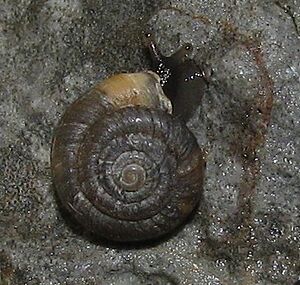Noricella oreinos facts for kids
Quick facts for kids Noricella oreinos |
|
|---|---|
 |
|
| A live individual of Noricella oreinos | |
| Conservation status | |
| Scientific classification | |
| Kingdom: | |
| Phylum: | |
| Class: | |
| (unranked): |
clade Heterobranchia
clade Euthyneura clade Panpulmonata clade Eupulmonata clade Stylommatophora informal group Sigmurethra |
| Superfamily: |
Helicoidea
|
| Family: |
Hygromiidae
|
| Genus: |
Noricella
|
| Species: |
N. oreinos
|
| Binomial name | |
| Noricella oreinos (A. J. Wagner, 1915)
|
|
| Synonyms | |
|
|
Noricella oreinos is a small, air-breathing land snail. It is a type of mollusk found on land. This snail belongs to the Hygromiidae family, often called "hairy snails."
This special snail lives only in Austria. For a long time, people thought it was a different snail called Trochulus hispidus. This was because they looked very similar. But scientists later discovered that Noricella oreinos was unique. They gave it its own group, or Noricella genus. Now, the Noricella group includes two species.
What is Noricella oreinos?
Noricella oreinos is a small snail with a unique shell. Its shell has tiny, curled hairs. These hairs are very short, only about 0.03 to 0.09 millimeters long.
Older snails often lose their hairs. Empty shells also usually do not have hairs. The shell itself can be flat or slightly rounded. It measures about 5.4 to 7.5 millimeters wide.
You can also spot this snail by its shell's rough, uneven ridges. Inside the shell's opening, called the peristome, there is a small rib with a tooth-like bump. This part looks yellow from the outside.
There is a closely related snail, Noricella scheerpeltzi. Its shell often has a groove under its edge. However, some snails have only a partial or weak groove. This shows they are related.
Where does Noricella oreinos live?
Noricella oreinos lives in the Northern Calcareous Alps in Austria. It prefers rocky areas like large boulders and screes. It also lives in alpine grasslands. These are high mountain meadows with patches of plants. One common plant there is a type of sedge called Carex firma.
This snail lives at high elevations. You can find it from about 1,400 meters up to 2,300 meters high. Its home range stretches from Schneeberg mountain to Totes Gebirge. Scientists believe this snail is very old. It might have survived the Ice Age in parts of the Alps that were not covered by ice.


